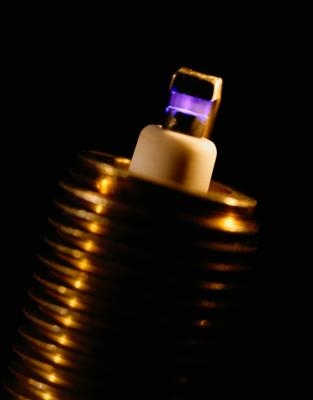
At first glance, spark plugs seem to perform a fairly simple task: to create a gap allowing an electrical arc to ignite compressed air and fuel. While almost any piece of copper wire could perform such a job, spark plugs need to do it dozens of times per second under some truly intense conditions. But while many companies claim to produce mileage-enhancing plugs, enhancing gas mileage actually comes down to choosing the right plugs for your engine and application.
Standard spark plugs use a steel band set a short distance from a steel tip. The electrical arc jumps from the tip to the band, which is grounded to the cylinder head. Steel is a decent electrical conductor, but iridium, platinum and copper are better. Better electrical conductivity means a stronger spark and better fuel economy, but do your homework. Many of these iridium/platinum/copper-tipped spark plugs come preset with a standard-sized gap from the manufacturer, which (combined with the material's more efficient energy transfer) can actually produce a smaller and weaker spark than stock plugs. You may need to widen the spark plug gap to take advantage of the material's increased efficiency and see any noticeable improvement in mileage.
All spark plugs use some sort of ceramic insulator (the white part on the plug) to contain heat inside the combustion chamber. A shorter insulator allows heat to radiate out and keep the plug tip cooler; a longer one keeps the plug hotter and enhances combustion efficiency, throttle response and mileage. If you do most of your driving around town, don't have a high-compression or turbocharged engine and don't do much racing, then you might want to consider installing a "hotter" (longer insulator) spark plug. A hotter spark plug tip will also allow you to run a little more plug gap for increased spark size and efficiency.
There are a lot of spark plugs on the market today with two or four ground straps. Such spark plugs are often inaccurately referred to as "multiple-tip." There's only one tip, but multiple ground straps allow the spark to follow the path of least resistance. This can be a boon to engines with a comparatively weak distributor or single-coil ignition system, where multiple ground straps will help to ensure that the spark plug fires every time it's supposed to. However, engines using powerful coil-on-plug or direct ignition are typically better off using a single, wide-gap iridium/platinum/copper-tipped plug. Multiple ground straps can actually impede flame travel and efficiency, so don't use them unless you really need to.